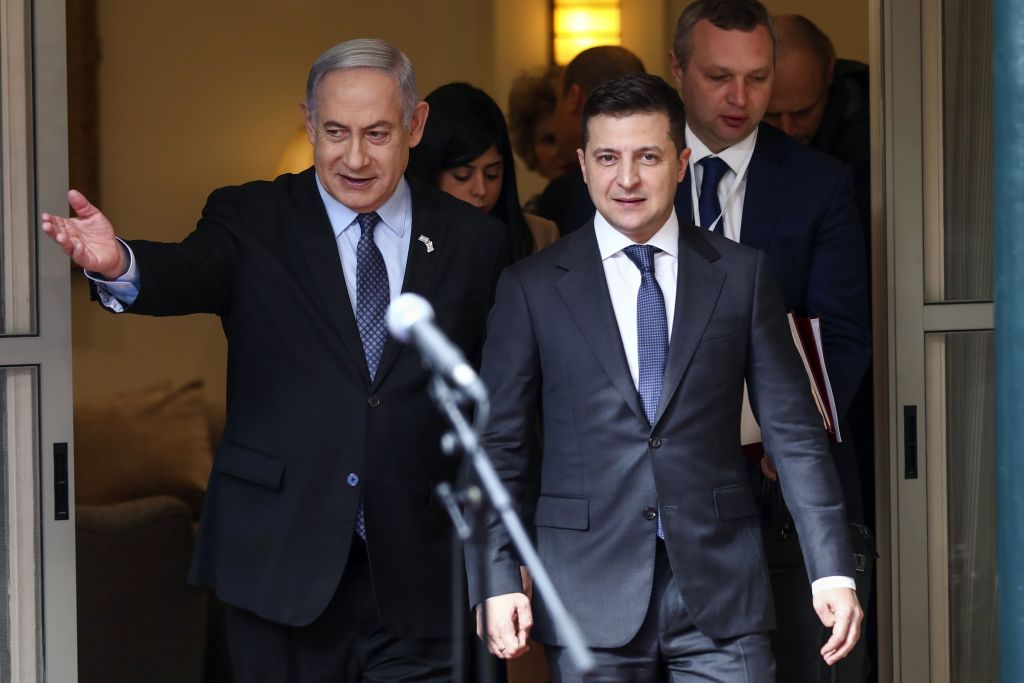
The United Nations’ General Assembly brings world leaders to New York each fall to discuss global problems like escalating climate disasters and widening inequality. But on the sidelines, heads of state often use their time in midtown Manhattan to pull aside leaders they need to glad-hand and cajole.
That’s how Israeli Prime Minister Benjamin Netanyahu and Ukrainian President Volodymyr Zelensky met Tuesday afternoon, the first face-to-face meeting for the two leaders since the start of Russia’s war with Ukraine 18 months ago. Zelensky has been wanting to press Netanyahu in person for more assistance and a more coordinated front against Iranian weapons transfers to Russian forces in Ukraine.
But Israel, which relies on Russian-controlled airspace over Syria to attack Iranian proxies in the region, has been careful not to irk Moscow. That has required walking a fine line.
After Russian President Vladimir Putin tried to topple Kyiv last year, Israel’s decision to not join other countries in imposing sanctions on Russia stood out on the world stage. Russian citizens and oligarchs still have freedom of movement in and out of Israel. No Israeli Prime Minister has visited Ukraine’s capital since Russia stepped up its aggression. And while Israel has provided humanitarian aid and defensive warning systems to Ukraine, it has balked at sending lethal, offensive military equipment or its most effective anti-missile technology.
Zelensky would like to change that. He also has sought to partner with Israel on working to block Iranian arms shipments to Russia for use in Ukraine. For months, Russian forces have used Iranian-made Shahed drone systems to attack Ukrainian cities. US intelligence officials have said that Iranian soldiers have been spotted in Crimea helping Russian forces use Shahed drones to strike Ukrainian power stations and infrastructure, and likely honing the use of the technology.
In May, Zelensky called out Iran for selling its weapons to Russia, telling Tehran in a video address that Iran was acting as “an accomplice to Russian terror.”
That presents a complicated, but common interest between Israel and Ukraine in finding ways to stop the flow of Iranian drone arsenals, says Bradley Bowman, senior director of the Center on Military and Political Power at the Foundation for Defense of Democracies. “Both Zelensky and Netanyahu are leaders of countries that are suffering from Iranian weapons, so that creates all kinds of opportunities for intelligence sharing and cooperation to better defend their respective people,” says Bowman.
More From TIME
When Zelensky walked into the meeting room on the sidelines of the UN general assembly, he gripped Netanyahu’s hand and the two leaders leaned forward and patted each other on the back, according to video posted online. “You have a very big team,” remarked Zelensky, as he shook hands with a line of Israeli officials. Gilad Erdan, Israel’s ambassador to the UN, explained the meeting was “very attractive” and “there were other people who wanted to participate.”
As Zelensky was about to sit down, he saw Israeli’s top intelligence official, Mossad director David Barnea, across the room, and walked over to shake his hand and the two embraced and spoke briefly.
Zelensky later posted on X, the social media platform formerly known as Twitter, that he and Netanyahu focused their talks “on our cooperation” and “civil defense.” “I informed him about Russian strikes on our cities, ports, and critical infrastructure using Iranian drones,” Zelensky wrote. “We share concern about the increasing military cooperation between Russia and Iran.”
Israeli officials declined to provide many details about what was discussed in the meeting with Zelensky. A statement from Netanyahu’s office described the meeting as “cordial” and said that Netanyahu “made it clear that Israel would continue to assist Ukraine on humanitarian issues, including dealing with anti-personnel mines.”
Zelensky was not the only world leader Netanyahu met with on the sidelines of the annual diplomatic gathering. He also had a one-on-one with President Joe Biden, who has yet to invite Netanyahu to the White House since he returned to the role of prime minister in December. It may end up being a break with tradition on Biden’s part. For decades, the U.S. president has welcomed the newly installed Israeli Prime Minister to the White House within the first year of the Israeli leader taking office. (Biden still has a few months to extend an invite.) The less formal meeting at the UN gathering amounted to a half measure from Biden, reflecting his concerns over Netanyahu’s policies toward Palestinians in the West Bank and his controversial push to weaken Israel’s judiciary.
Protests have followed Netanyahu during his visit to the U.S. In San Francisco, where the Israeli leader met with Elon Musk, protestors projected an illustration of Netanyahu in prison garb on a wall of the infamous former prison Alcatraz in San Francisco Bay. In the days before Netanyahu arrived in New York, activists projected a message onto the side of the iconic UN building that read, “Don’t believe Crime Minister Netanyahu. Protect Israeli democracy.”
Aaron David Miller, a senior fellow at the Carnegie Endowment for International Peace and a former State Department senior advisor for Arab-Israeli negotiations, says that the Biden Administration has been cooperating extensively with Israeli officials in recent months, including spending time brokering talks with the Saudi royal family to normalize relations between Israel and Saudi Arabia, but that Biden has been reluctant to give Netanyahu the high-profile platform that comes with a White House visit. “I think the administration didn’t want to legitimize the Israeli government at a time when it’s very unhappy, both on the issue of the judicial overhaul and Israeli policies with the Palestinians,” Miller says.
More from TIME
On Ukraine, Miller adds, Israeli leaders have acted very cautiously to avoid upsetting Russia, and the Biden Administration has not leaned significantly on Israel to do more. “I think the Americans have given the Israelis a sort of margin to operate without calling in chits and pressing them hard,” Miller says.
